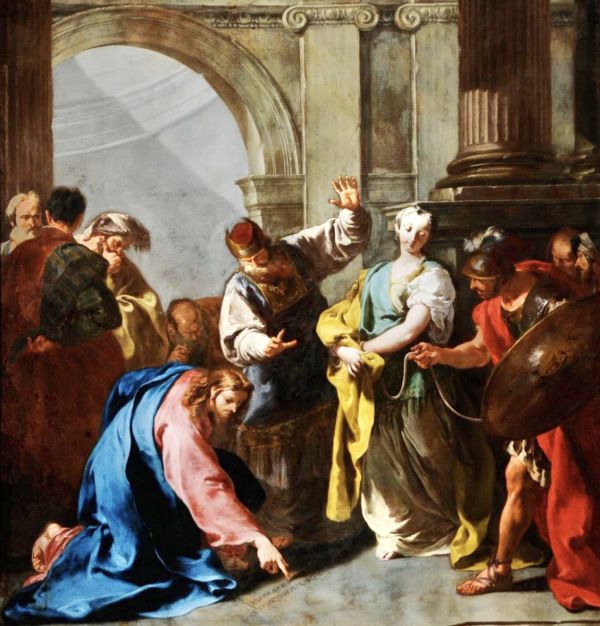The woman caught in adultery and brought by the scribes and Pharisees to Jesus is the specious 'fig leaf' they use to cover their sins.
The Lord knows this to be so, as to say to the bystanders:
«Let him who is without sin among you cast a stone at her first» (Jn 8:7).
He condemns the lack of mercy, shown in an arrogant and clumsy manner.
Francis was truly the herald of Compassion - the one who always made this prevail, along with patience, in the face of the sinner, giving time to change his life.
In his Letter to a Minister he writes:
"If any of the brothers, at the instigation of the enemy, has mortally sinned, he is bound by obedience to have recourse to his guardian.
And all the brothers who know of his sin, let them not be ashamed or speak ill of him, but have great mercy on him and keep the sin of their brother very secret, because it is not the healthy who need a doctor, but the sick" (FF 237).
This attitude was also profoundly transmitted to his own, so much so that:
"One day when two brethren were walking together, they came across a madman, who started throwing stones at them.
One of them, seeing that the stones were directed at his companion, immediately stepped in front of him, preferring to be hit himself instead of his brother.
Such was the mutual love that inflamed them, and so sincerely were they ready to lay down their lives for one another" (FF 1447 - Legend of the Three Companions).
Taking upon oneself the stones directed at the other: a great merciful heart that wants the salvation of one's neighbour.
On the other hand, the Poor Man of Assisi, while hating sin, welcomed with great pity those who had fallen into error.
God had remembered him when he was in sin, and now he felt called to do the same for others.
In his memory, the Gospel sentence he had experienced was fixed:
«Go, do likewise» (Lk 10:37).
In the Testament of Francis (1226) we read:
"When I was in sin, it seemed too bitter for me to see lepers; and the Lord himself led me among them and I used mercy with them" (FF 110).
In the Major Legend, the biographer St Bonaventure narrates:
"No wonder: just as the pity of his heart had made him a brother to all creatures, so the charity of Christ made him even more intensely a brother to those who bear within themselves the image of the Creator and have been redeemed by the blood of the Redeemer.
He did not consider himself a friend of Christ if he did not lovingly care for the souls redeemed by Him.
Nothing, he said, should be put before the salvation of souls, and he confirmed this assertion above all with this argument: that the Only-Begotten of God, for the sake of souls, had deigned to go up on the cross' (FF 1168).
The clear consciousness of the salvation received gratuitously had made Francis the standard bearer of Mercy, who turns his gaze on the wretched in need of being healed and reawakened.
«Let him who is without sin among you cast a stone at her first» (Jn 8:7)
5th Sunday in Lent C (Jn 8:1-11)












